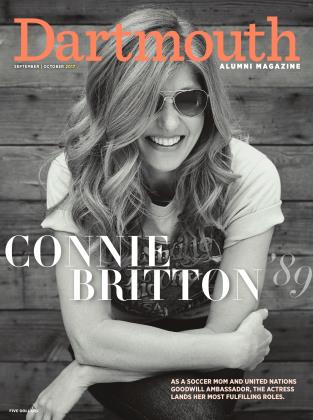A Creole Mosaic
alumni books
MARGARET WILKERSON SEXTON ’04
IN HER DEBUT NOVEL, SEXTON ILLUMInates the intergenerational struggles of an African American family in her native New Orleans, a territory whose customs, landmarks and dialects she knows well. The characters in A Kind of Freedom are chained to the indignities of segregation, job discrimination and police harassment. Lines of color and class further divide them. But the characters also revel in Mardi Gras and gumbo and lean on their (sometimes frayed) loyalties to one another.
Sexton’s narrative weaves skillfully back and forth across three time periods and social contexts: the era of World War II and Jim Crow, the crack epidemic of the 1980s and the shattered post-Katrina city of 2010-11. Within each era, the story adopts the perspective of a single character.
We first meet Evelyn, abright doctor’s daughter, as she falls for Renard, a man whose pants with an “uneven hem” mark him as a misfit. Beset by quotidian humiliations, he seeks a path to manhood by volunteering for war. A generation later the couple’s daughter, Jackie, marries another wellmeaning but ineffectual man, Terry, who struggles with crack addiction. Their son, Evelyn’s grandson, T.C., having grown up mostly fatherless, develops a weakness for weed and a knack for cultivating it. Careless and unlucky, he becomes yet another victim of a war on drugs that targets even penny-ante dealers. From a prison cell, he hopes desperately that his son will have a better life.
Though anchored in history, A Kind of Freedom is more intimate than epic, a tale of disappointment, displacement and loss. But it is also a testament to the persistence of family bonds in an increasingly matrilineal community. For Sexton, romantic love can be redemptive, but also destructive and unreliable. Sisters may be both best friends and bitter rivals. The most lasting and truest bonds seem to be those between parent and child. Written with a sure feeling for shifting cultural norms and the distinctive patois of each period, this piercingly lovely novel asks whether the future can shake off the bonds of the past.
Julia M. Klein
 View Full Issue
View Full Issue
More From This Issue
-
 Cover Story
Cover StoryNo Script Required
SEPTEMBER | OCTOBER 2017 By Jennifer Wulff ’96 -
 Feature
FeatureCell Power
SEPTEMBER | OCTOBER 2017 By KRISTIN (COBB) SAINANI ’95 -
 Feature
FeatureSerenity Now
SEPTEMBER | OCTOBER 2017 -
 Personal History
Personal HistoryCrossing the Line
SEPTEMBER | OCTOBER 2017 By ANDY BARRIE '67 -
 Sports
SportsThe Digital Recruit
SEPTEMBER | OCTOBER 2017 By ADAM BOFFEY -
 INFOGRAPHIC
INFOGRAPHICIn the Pits
SEPTEMBER | OCTOBER 2017 By MATT CROSSMAN
Julia M. Klein
-
 FEATURE
FEATUREMeanwhile, In Illinois
NOVEMBER | DECEMBER 2015 By JULIA M. KLEIN -
 BOOKS
BOOKSParty Crasher
MAY | JUNE 2018 By JULIA M. KLEIN -
 pursuits
pursuitsBurning with Intrigue
JULY | AUGUST 2018 By Julia M. Klein -
 Books
BooksPop Fiction
MARCH|APRIL 2019 By JULIA M. KLEIN -
 FEATURE
FEATURECritical Condition
MARCH | APRIL 2022 By JULIA M. KLEIN -

Bridge Builder
NOVEMBER | DECEMBER 2025 By JULIA M. KLEIN
Pursuits
-
 Pursuits
PursuitsNew Books By Alumni
NOVEMBER | DECEMBER 2016 -
 pursuits
pursuitsEDITOR’S PICKS
MAY | JUNE 2017 -
 PURSUITS
PURSUITSMusic Man
NOVEMBER | DECEMBER 2019 By George M. Spencer -
 PURSUITS
PURSUITS“A Lot of Love”
MAY | JUNE 2024 By Heya Shah ’26 -
 pursuits
pursuitsSuds-cess
JANUARY | FEBRUARY 2018 By Ishaan H. Jajodia ’20 -
 PURSUITS
PURSUITSJENN SCOTT ’90 Heart of Pom
NOVEMBER | DECEMBER 2025 By Nancy Schoeffler

